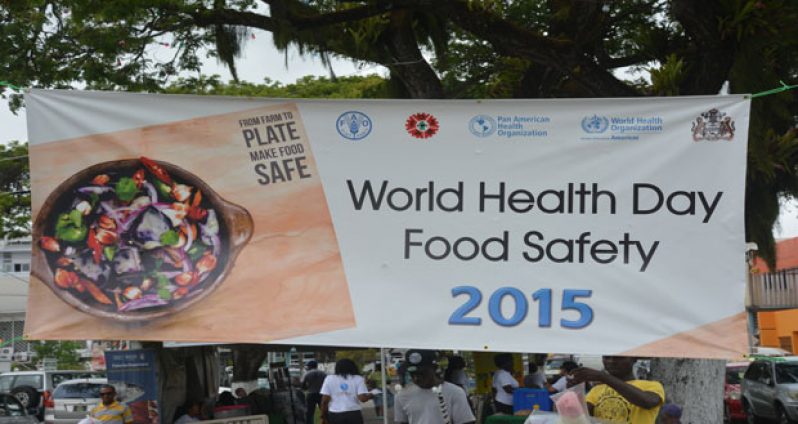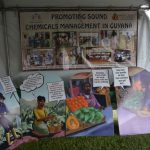THE Pan American Health Organization/World Health Organization (PAHO/WHO), in collaboration with Safety and Security Partners, yesterday hosted a massive World Health Day Street Fair on Main Street Avenue, between Quamina and New Market Streets in Georgetown.Held under the theme “From Farm to Plate: Keep it Safe”, the venture was a huge success and attracted hundreds of students from secondary schools around the city, as well as the general public who all showed keen interest in the information shared by the stakeholders.
Among the partners joining with PAHO/WHO in hosting the Street Fair were the Food and Agriculture Organization; Guyana National Bureau of Standards; Mayor and City Council; the National Food Safety and Control Committee of the Government Analyst Food and Drug Department, Wellness Warriors and related departments of the Ministries of Agriculture, Health and Education.
World Health Day is observed on April 7 each year, commencing in 1948, the year in which the WHO was founded.
In a statement issued by the local PAHO/WHO Office, PAHO’s Resident Representative, Dr. William Adu Krow noted that the theme for this year’s observances “From Farm to Plate, Make Foods Safe” provides an opportunity to alert governments, manufacturers, retailers and the public about the importance of food safety and the part each can play in ensuring that the food on people’s plates is safe to eat.
Noting that every day people around the world get sick from the food they eat, Dr. Adu Krow disclosed that food-borne diseases kill an estimated 2.2 million people annually, most of whom are children. He pointed out that food-borne illnesses are usually infectious or toxic in nature. They are usually caused by bacteria, viruses, parasites, prions or chemical substances entering the body through contaminated food or water.
“Food-borne diseases not only adversely affect people’s health and wellbeing, but also have negative economic consequences for individuals, families communities, businesses and countries. These diseases impose a substantial burden on health-care systems trade and tourism and markedly reduce economic productivity and threaten livelihood,” the PAHO Representative said.
Dr. Adu Krou added that food safety and control systems need to adapt to today’s food production and distribution practices, moving their focus gradually from the end-product testing to process control throughout the food chain.
Towards this end, he cautioned that, “Education and training of food safety workers need to take these challenges and development into account.”
Meanwhile, PAHO/WHO, on the occasion of World Health Day 2015, has stressed the importance of global prevention, detection and response to public health threats associated with unsafe foods; ensuring the achievement of consumer trust in their authorities and confidence in food supply.
Dr. Adu Krow challenged the public sector to play a pivotal role in building a community of various stakeholders and partners who share common goals and responsibilities. Further, that the partnership should encompass consumer and school education, science and research, agriculture and fishery, tourism, trade and industry, as well as regulatory authorities.
Moreover, he warned that key players need to have a timely access to reliable and up-to-date information, including emergency alerts so that collective action can be taken.
Noting that a food safety problem in one country immediately puts other countries at risk if not addressed promptly, Dr. Adu Krow assured that PAHO/WHO will continue to work with all their member states to ensure ‘the food we eat from our plates is safe for all individuals and their families.’
Meanwhile, Minister of Health, Dr. Bheri Ramsaran, in his World Health Day message, said that the Government of Guyana, through the Ministry of Health, has placed Food Safety on the front burner. “Our interventions seek to protect consumers from the risk of food poisoning and food borne diseases, acute or chronic and shoddy food products,” the health minister said. He added that the Ministry of Health’s Food and Drug Department is committed to ensuring that Guyanese have confidence in the foods they buy and eat.
Having recently strengthened this unit, the minister pledged that his ministry will also strengthen its capacity to execute its mandate of inspection and enforcement, through expansion of its already robust training programme. He said that the government of Guyana will continue to work with its strategic partners such as PAHO/WHO; the Inter-American Institute for Co-operation on Agriculture (IICA); Food and Agriculture Organization; Guyana National Bureau of Standards and others, to further strengthen food inspection regimes.
Food safety plugged at World Health Day Street Fair – further strengthening of food inspection regimes on front burner
SHARE THIS ARTICLE :
Facebook
Twitter
WhatsApp




.png)

















